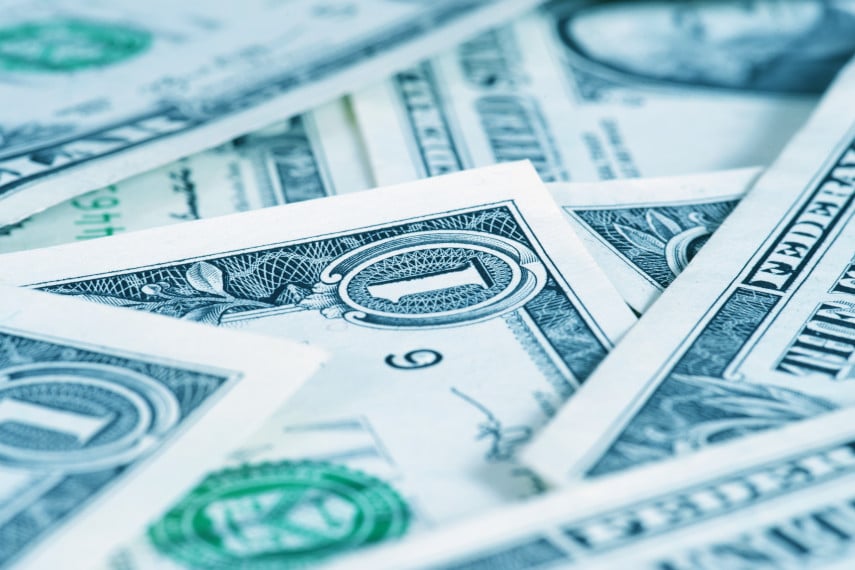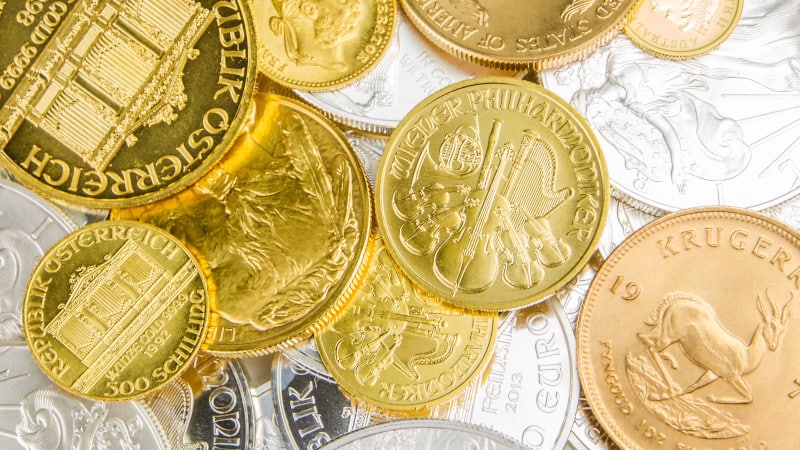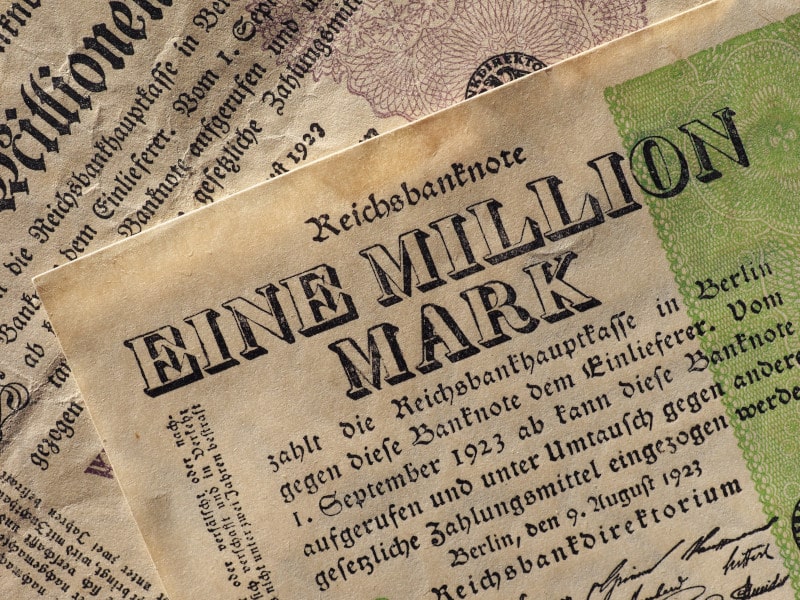3 Easy Steps to Roll Over Your TSP Into an IRA
Over 70 million Americans today have 401(k) accounts, making them one of the most popular types of retirement accounts Federal employees don’t have 401(k) accounts, but instead have the Thrift...
Precious Metals

Anyone who has been following trends in money and banking over the past several years has seen the increasing push for electronic, digital, and online payments. At all levels, from government to banks to private businesses, cash is increasingly being seen as a liability rather than an asset.
These concerted moves towards digital payments, and the continued decline in the use of cash, has spurred fears of a war on cash.
Cash’s great benefit is that it is an anonymous form of payment. Money changes hands, goods are exchanged, and neither party needs to know who the other person is, what he does, or anything else.
But governments hate that, and so they’re pushing electronic payments in order to de-anonymize as many financial transactions as possible.
Cash allows people to trade with each other without scrutiny from third parties. Governments like to disparage cash use as enabling tax evasion, money laundering, or other criminal activity.
But for people who live in countries with draconian regulations or excessive taxation, cash allows them to keep the government out of their business, and allows economies to function in the face of excessive government interference. And that’s why many governments would like to eliminate cash.
In a world without cash, and in which every transaction is recorded electronically, governments will have a record of every transaction that takes place, allowing them to tax whatever they want to, whenever they want to, or prohibit sales whenever they want to.
Not being able to escape that electronic database means that individuals and businesses can be taxed at ever higher levels, or can be subject to asset seizures or spending bans, with no recourse since cash no longer exists.

Fears of cash being a potential carrier of the COVID-19 virus led to many businesses banning the use of cash, and to fears among the general population that cash might be infected. Never mind that cash has been exposed to virus carriers of the flu, common cold, and other viruses for decades.
And never mind that cash has been exposed to illegal drugs, feces, and other contaminants every day. All of a sudden cash became a potential vector for COVID, and its use plummeted.
Combined with the drop in face-to-face business as a result of nationwide lockdowns and the rise in online ordering, and more and more Americans became comfortable with a cashless society. That may end up being the future, if current trends persist.
As late as 2017, cash made up 31% of all financial transactions. But last year that number was nearly cut in half, with cash only making up 16% of all financial transactions.
Cash’s declining use has been slow and steady, and within another decade cash use may be far less than it is today.

One glimpse of the future that faces us may be found in Sweden, which has probably advanced further along the road to a cashless society than any other Western nation. Cash purchases make up such a small portion of economic transactions in Sweden today that many banks don’t even have cash on hand anymore.
And getting cash from an ATM? Forget about it, because many businesses don’t even accept cash anymore.
While many businesses today gripe about the cost of swipe fees and merchant agreements with credit card processors, the alternative in taking cash payments requires storage of cash, transfer to banks at the end of the business day, and the risk of theft or robbery.
Digital payments render all of that moot, making it an attractive option for businesses looking to cut costs and reduce overhead. The downside to consumers, however, is that every transaction is now recorded, and can be positively linked back to a specific person.
If the government decides years down the road to come after everyone who purchased XYZ good or service years in the past, that task is made infinitely easier through records of electronic payments.
As central banker Agustin Carstens famously stated a few years ago, a “key difference with the CBDC [central bank digital currency] is the central bank will have absolute control on the rules and regulations that will determine the use of that expression of central bank liability, and also we will have the technology to enforce that.”

For those who worry about the war on cash and the threat to freedom that it entails, holding tangible assets has become increasingly important. In a world without physical cash, where all transactions are electronic, and in which all money is digital, there are no checks or balances on the government’s ability to create money ad infinitum.
Any problem the government comes across, the solution may very well be to create more digital money. We’re probably 90% of the way there already, but once the process is complete, there will be no limit to the government’s ability to create money out of thin air.
That, in turn, could mean even greater devaluation of the dollar. If you thought the dollar’s value and purchasing power was low already, just wait until cash disappears.
One way to help protect yourself against that coming loss of purchasing power is by owning tangible assets that hold their value in the face of inflation. That includes assets such as gold and silver.
Many people over the centuries have helped protect their wealth with gold and silver, while others have had to learn the hard way that the paper assets or electronic assets they held can very quickly lose their value.

In every hyperinflationary crisis in history, having tangible assets has been incredibly beneficial in helping people weather the crisis. Those who prided themselves on bank account balances or pension promises sometimes watched in horror as the value of their savings deteriorated substantially.
With the future increasingly becoming digital, and with the federal government demonstrating that it’s willing to suffer high inflation and massive increases in debt in order to achieve its goals, those who haven’t yet resorted to tangible assets to help safeguard their wealth have been put on warning.
Americans today have even more options than many people in previous generations did when it comes to purchasing tangible assets such as gold and silver. That includes purchasing relatively recent innovations such as a gold IRA.
A gold IRA offers you the same tax advantages as you would have with any conventional IRA, only that a gold IRA owns physical gold coins or bars rather than electronic financial assets such as stocks or bonds.
You can fund a gold IRA with a tax-free rollover from existing 401(k), 403(b), TSP, IRA, or similar retirement accounts. And when you decide to take a distribution, that distribution can be taken either in cash or in physical metals.
It’s clear that the war on cash is ongoing and relentless. It could only be a matter of time before cash is eliminated or people are forced to adopt central bank digital currencies.
Once cash is eliminated, there is no guarantee that central banks won’t take advantage of a captive public to devalue the dollar even further. And that could negatively impact the value of dollar-denominated assets as the dollar continues to become devalued into worthlessness.
Are you willing to put all your faith and trust in the value and strength of the dollar? Or would you rather hedge your bets and try to protect yourself with tangible assets like gold and silver?
If you’re worried about the direction of this country and its finances, maybe now is the time to start thinking about how you’re going to protect yourself. Call Goldco today to learn more about how you can benefit from gold and silver.
This article was originally published in July 2020 and was updated in September 2024.

